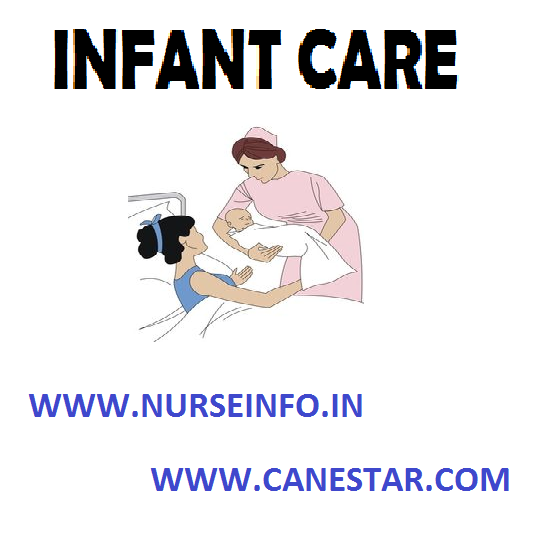INFANT CARE – Physiological Developments and Role of Nurse in Infant Care (CHILD HEALTH NURSING)
Infant growth and development is rapid and enables maturation to unfold in a relatively short time. Health status is based on the infant’s ability to adapt to these rapid changes. As healthcare providers, the nurse must have an understanding of these changes to ensure the infant and his or her family maintains an optimal health
PHYSIOLOGICAL DEVELOPMENTS
Height and weight: height increases during the first 6 months by approximately one inch per month. The rate of growth in height slows to approximately 0.5 inches per month by 12 months of age. The weight gains 1.5 lb per month or 5-7 oz per week. By 12 months of age, the infant’s birth weight will have tripled
Head growth: the size of the head changes rapidly during infancy, reflecting rapid brain growth. By the age of 12 months the infant’s brain will be two thirds the size of a adult brain. During first 6 months the head circumference will increase by approximately 0.5 inches per month
Motor development: motor development is related to physical, cognitive, and social development, which provides the infant with the means and freedom to explore the environment. Gross motor development is the ability to use large muscle groups to maintain balance and postural control or locomotion. Fine motor development is the ability to coordinate hand-eye movement in an orderly and progressive manner
Health screening: health screening provides the opportunity to assess for detect any problems, the infant may have and includes test to detect phenylketouria (PKU), iron deficiency anemia, lead poisoning and hypothyroidism. The infant’s health screening actually begins immediately after birth with the Apgar scoring and physical examination. The screening visits typically include health assessment, physical examination, growth indicators, anticipatory guidance, parental concerns and administration of scheduled immunizations
A ROLE OF A NURSE IN INFANT CARE
The community health nurse can be instrumental in providing information related to development, nutrition, elimination, hygiene, safety, immunization and play. The nurse should provide information about possible reactions the infant might experience after receiving the immunizations
Feeding of infants: a child who is on breastfed has greater chances of survival than a child artificially fed. Prolonged breastfeeding does protect the infant from early malnutrition and some infections. Artificial feeding given the babies suffer with prolonged illness or death of the mother
Weaning is not sudden withdrawal of child from the breastfed. It is a gradual process starting around the age of 4-5 months because the mother’s milk alone is not sufficient to sustain growth beyond 4-5 months. It should be supplemented by suitable foods rich in protein and other nutrients. The community health nurse should clearly explain to the mother and family


